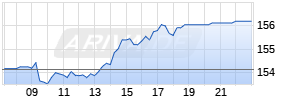
Merck KGaA, Darmstadt, Germany Data at ESMO 2018 Congress Highlight Multiple Therapeutics with Potential to Transform Cancer Care
PR Newswire
DARMSTADT, Germany, Oct. 9, 2018
ESMO Abstract #
Avelumab: LBA6_PR, 659P, 1290P, 1291P, 1282P, 877P; M7824 (TGF β-trap/anti-PD-L1): 1048O, 1463P, 1931P, 757P, 643P, 642P, 661P; tepotinib (MET kinase inhibitor): 1377O, 621PD, 698P; M6620: 1437P; M3814: 1845P; M7583: 1014PD; abituzumab: 487P
- First presentation of Phase III data for avelumab (plus axitinib) in previously untreated, advanced kidney cancer
- New and updated data for bifunctional immunotherapy M7824
- Results from Phase II trials for tepotinib, including in EGFR TKI-resistant NSCLC
- Additional pipeline data feature abstracts for a further four innovative agents across multiple tumor types with a significant patient need
DARMSTADT, Germany, Oct. 9, 2018 /PRNewswire/ -- Merck KGaA, Darmstadt, Germany, a leading science and technology company which operates its healthcare business in the U.S. and Canada as EMD Serono, today announced that new data from a variety of high-priority clinical development programs will be presented at the ESMO 2018 Congress (European Society for Medical Oncology Annual Meeting), October 19–23, 2018, Munich, Germany.
In the year that Merck KGaA, Darmstadt, Germany celebrates its 350-year anniversary, abstracts at the congress represent a company record with eight therapeutic agents across 14 tumor types, reinforcing Merck KGaA, Darmstadt, Germany's position at the forefront of clinical development in oncology.
"Our data at this year's European Society for Medical Oncology Congress expand our understanding of avelumab in renal cell carcinoma and other tumors, and demonstrate the headway we are making with our pipeline, including bifunctional immunotherapy M7824 and tepotinib," said Luciano Rossetti, Global Head of Research & Development for the Biopharma business of Merck KGaA, Darmstadt, Germany. "We look forward to many more years of real and significant progress towards our vision of transforming the management and treatment of cancer."
Data from the Phase III study JAVELIN Renal 101, evaluating avelumab* in combination with axitinib, compared with sunitinib as initial therapy for patients with advanced renal cell carcinoma (RCC), will be presented for the first time during the Presidential Symposium at ESMO on Sunday, October 21, 2018 at 5:20 PM – 5:35 PM CEST. Avelumab is being jointly developed and commercialized with Pfizer. The results represent the first positive Phase III immunotherapy trial in combination with a tyrosine kinase inhibitor (TKI) in any tumor type, supporting Merck KGaA, Darmstadt, Germany's interest in the potential use of avelumab in combination with currently approved therapies and novel agents. These results will be submitted for publication in a peer-reviewed journal. Other updates include new avelumab data in Merkel cell carcinoma (MCC) and advanced gastric or gastroesophageal junction (GEJ) cancer.
New data for M7824 will be presented from expansion cohorts of two ongoing Phase I clinical trials, including the first tumor-specific data for squamous cell carcinoma of the head and neck (SCCHN), biliary tract cancer, esophageal squamous cell carcinoma and esophageal adenocarcinoma. In addition, updated data for M7824 in patients with gastric cancer and non-small cell lung cancer (NSCLC) will be shared. M7824, discovered in-house at Merck KGaA, Darmstadt, Germany, is an investigational bifunctional immunotherapy designed to combine a transforming growth factor β (TGF-β) trap by 'fusing' it with the anti-programmed death ligand-1 (PD-L1) mechanism. To date more than 650 patients with various types of solid tumors have been treated across the program with M7824 and the safety profile is consistent with that observed with other PD-1/PD-L1 inhibitors and previously described skin lesions (keratoacanthomas, SCC, hyperkeratosis) associated with TGF-β-inhibiting therapies.
ARIVA.DE Börsen-Geflüster
Weiter abwärts?
| Kurzfristig positionieren in Merck KGaA | ||
|
HS354D
| Ask: 1,69 | Hebel: 19,90 |
| mit starkem Hebel |
Zum Produkt
| |
|
HS0FS1
| Ask: 3,20 | Hebel: 7,01 |
| mit moderatem Hebel |
Zum Produkt
| |

Kurse
 |
Data for tepotinib** include results from three Phase II trials in epidermal growth factor receptor (EGFR) TKI-resistant NSCLC and advanced hepatocellular carcinoma, providing further evidence of this precision medicine's potential clinical activity in a range of tumors. Tepotinib, discovered in-house at Merck KGaA, Darmstadt, Germany, is an investigational, oral MET inhibitor that is designed to selectively inhibit the oncogenic MET receptor signaling caused by MET (gene) alterations or MET protein overexpression.
Additional pipeline abstracts feature updated data from Merck KGaA, Darmstadt, Germany's comprehensive DNA damage response (DDR) portfolio. These include results from a Phase I trial investigating M6620 (formerly VX-970) in combination with gemcitabine in patients with advanced NSCLC, and combined data from two Phase I trials of DNA-dependent protein kinase inhibitor, M3814. Results will also be shared from a Phase I/II trial of M7583, a Bruton's TKI, in patients with B-cell malignancies, as well as a retrospective analysis of the Phase I/II Poseidon study investigating abituzumab in patients with metastatic colorectal cancer (mCRC).
Data to be presented at the congress for Erbitux® will add to the growing body of real-world evidence supporting the therapy's role as a standard of care in RAS wild-type mCRC and first-line recurrent or metastatic SCCHN (R/M SCCHN), and for patients with locally advanced SCCHN (LA SCCHN) who may not be able to tolerate cisplatin-based regimens in full.
*Avelumab is under clinical investigation for the treatment of RCC, MCC, CRC, gastric and GEJ cancer, and has not been demonstrated to be safe and effective for these indications. There is no guarantee that avelumab will be approved for RCC, CRC, gastric or GEJ cancer by any health authority worldwide.
**Tepotinib is the recommended International Nonproprietary Name (INN) for the MET kinase inhibitor MSC2156119J. Tepotinib is currently under clinical investigation and not approved for any use anywhere in the world.
Tepotinib, M7824, M3814, M7583, M6620 and abituzumab are under clinical investigation and have not been proven to be safe and effective. There is no guarantee any product will be approved in the sought-after indication by any health authority worldwide.
Notes to Editors
Key abstracts supported by Merck KGaA, Darmstadt, Germany, slated for presentation are listed below. In addition, a number of investigator-sponsored studies have been accepted (not listed).
| Title | Lead Author | Abstract # | Presentation Date / Time (CEST) | Location |
| Avelumab | ||||
| Late-Breaking Abstracts | ||||
| JAVELIN Renal 101: a randomized, phase 3 study of avelumab + axitinib | R Motzer | LBA6_PR | Sun, Oct 21, 4:30 – 6:10 PM (5:20 – 5:35 PM lecture time) | Hall A2 – Room 18 |
| Poster Sessions | ||||
| Avelumab (anti–PD-L1) in Japanese patients with advanced gastric or | T Doi | 659P | Sun, Oct 21, | Hall A3 – Poster Area Networking Hub |
| Avelumab in European patients (pts) with metastatic Merkel cell | P Nathan | 1290P | Sun, Oct 21, | Hall A3 – Poster Area Networking Hub |
| Cost-effectiveness (CE) of avelumab vs standard care (SC) for the treatment of patients (pts) with metastatic Merkel cell carcinoma (mMCC) | M Bharmal | 1291P | Sun, Oct 21, | Hall A3 – Poster Area Networking Hub |
| Responder analysis based on patient-reported outcomes (PROs) | SP D'Angelo | 1282P | Sun, Oct 21, | Hall A3 – Poster Area Networking Hub |
| First-line (1L) or second-line (2L) avelumab monotherapy inpatients (pts) with advanced renal cell carcinoma (aRCC) | UN Vaishampayan | 877P | Mon, Oct 22, | Hall A3 – Poster Area Networking Hub |
| Title | Lead Author | Abstract # | Presentation Date / Time (CEST) | Location |
| M7824 (TGF β-trap/anti-PD-L1) | ||||
| Proffered Paper Session | ||||
| M7824 (MSB0011359C), a bifunctional fusion protein targeting PD-L1 and TGF-β, in patients (pts) with advanced SCCHN: results from a phase 1 cohort | BC Cho | 1048O | Mon, Oct 22, | ICM, Room 14B |
| Poster Sessions | ||||
| Updated results of M7824 (MSB0011359C), a bifunctional fusion protein targeting TGF-β and PD-L1, in second-line (2L) NSCLC | L Paz-Ares | 1463P | Sat, Oct 20, | Hall A3 – Poster Area Networking Hub |
| Assessment of PD1/ | T Mrowiec
| 1931P | Sun, Oct 21, | Hall A3 – Poster Area Networking Hub |
| M7824 (MSB0011359C), a bifunctional fusion protein targeting PD-L1 and TGF-β, in Asian patients with pretreated biliary tract cancer: preliminary results from a phase 1 trial | C Yoo | 757P | Sun, Oct 21, | Hall A3 – Poster Area Networking Hub |
| M7824 (MSB0011359C), a bifunctional fusion protein targeting PD-L1 and TGF-β, in patients with post-platinum esophageal adenocarcinoma (EAC): preliminary results from a phase 1 cohort | B Tan | 643P | Sun, Oct 21, | Hall A3 – Poster Area Networking Hub |
| Phase 1 study results from an esophageal squamous cell carcinoma (ESCC) cohort treated with M7824 (MSB0011359C), a bifunctional fusion protein targeting transforming growth factor β (TGF-β) and | CC Lin | 642P | Sun, Oct 21, | Hall A3 – Poster Area Networking Hub |
| Updated results from a phase 1 trial of M7824 (MSB0011359C), a bifunctional fusion protein targeting PD-L1 and TGF-β, in patients with pretreated recurrent or refractory gastric cancer | YJ Bang Werbung Mehr Nachrichten zur Merck KGaA Aktie kostenlos abonnieren
E-Mail-Adresse
Bitte überprüfe deine die E-Mail-Adresse.
Benachrichtigungen von ARIVA.DE (Mit der Bestellung akzeptierst du die Datenschutzhinweise) -1  Vielen Dank, dass du dich für unseren Newsletter angemeldet hast. Du erhältst in Kürze eine E-Mail mit einem Aktivierungslink. Hinweis: ARIVA.DE veröffentlicht in dieser Rubrik Analysen, Kolumnen und Nachrichten aus verschiedenen Quellen. Die ARIVA.DE AG ist nicht verantwortlich für Inhalte, die erkennbar von Dritten in den „News“-Bereich dieser Webseite eingestellt worden sind, und macht sich diese nicht zu Eigen. Diese Inhalte sind insbesondere durch eine entsprechende „von“-Kennzeichnung unterhalb der Artikelüberschrift und/oder durch den Link „Um den vollständigen Artikel zu lesen, klicken Sie bitte hier.“ erkennbar; verantwortlich für diese Inhalte ist allein der genannte Dritte. Andere Nutzer interessierten sich auch für folgende News | |||



